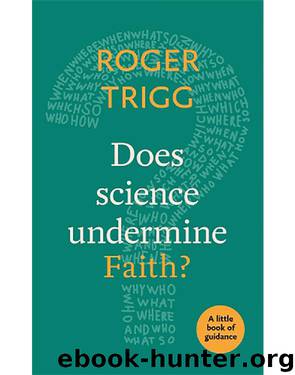Does Science Undermine Faith by Does Science Undermine Faith (2

Author:Does Science Undermine Faith (2
Language: eng
Format: epub
Published: 2019-11-22T16:00:00+00:00
3
Could science support Christianity?
The ‘anthropic principle’
If science and Christian faith both attempt to deal with the same world, it is wrong to insulate them from each other. Could they therefore not conflict, but actually on occasion support one another? It is fanciful to suppose that science can prove the truth of any religious faith any more than it can disprove it. This is not just because its methodology and purposes are significantly different. Science is not in the business of proof, in the sense that mathematics or geometry is. It puts forward theories that have to be held tentatively until all the facts are in, and for humans, that may be never, in this life. We cannot attain omniscience. Even a fundamental scientific theory has to be held as a matter of faith, however strongly held. Contrary evidence may always be forthcoming, as Karl Popper pointed out when he showed the impossibility of proving that all swans are white. There may always be a black swan about to be discovered.
Even if science is not in the business of logical proof, it can provide pointers to truth. A Christian would believe that God’s world is shot through with His purposes. God’s transcendence means that we may not wholly grasp His ways, but as we investigate the physical world, it would be strange if we did not see reflections of His will. The discipline of natural theology, looking from the world towards God, bears witness to this. It has had a strong influence through the centuries on English theology. The beauty of the world, and its apparent intricate design, has led many thinkers to see the world as God’s Creation. Even Charles Darwin, who ended up as an agnostic, was motivated to produce his theory of evolution by the theological argument for the existence of God from the apparent design observed in the biological world.
In more recent years, some biologists have used the theory of evolution to explain natural development and change without God. That has not destroyed the argument about design, but displaced it to a higher level. This was dramatized in the middle 1970s by the appeal in physics to the so-called ‘anthropic principle’. John Wheeler was a Princeton physicist who had been a pupil of Einstein, and was the originator of the phrase ‘black hole’ in cosmology. He posed the question why the universe is so large, and claimed that it was ‘because we are here’.7 He was not making a religious statement about God’s design, but was pointing out that the nature of the universe is such that carbon-based life, such as that of humans, could not be produced quickly. The size of the universe is linked to its time in existence. Carbon is produced by the death of stars, and would not exist in a young universe. This is one of many features of our universe that give rise to wonder. The cosmos must not expand too fast, or too slowly, and must have the right mix of forces for stars to burn for billions of years but then die out with a bang.
Download
This site does not store any files on its server. We only index and link to content provided by other sites. Please contact the content providers to delete copyright contents if any and email us, we'll remove relevant links or contents immediately.
The Lost Art of Listening by Michael P. Nichols(7480)
Why I Am Not A Calvinist by Dr. Peter S. Ruckman(4134)
The Rosicrucians by Christopher McIntosh(3503)
Wicca: a guide for the solitary practitioner by Scott Cunningham(3157)
Signature in the Cell: DNA and the Evidence for Intelligent Design by Stephen C. Meyer(3116)
Real Sex by Lauren F. Winner(3000)
The Holy Spirit by Billy Graham(2932)
To Light a Sacred Flame by Silver RavenWolf(2802)
The End of Faith by Sam Harris(2722)
The Gnostic Gospels by Pagels Elaine(2515)
Waking Up by Sam Harris(2445)
Nine Parts of Desire by Geraldine Brooks(2355)
Jesus by Paul Johnson(2347)
Devil, The by Almond Philip C(2321)
The God delusion by Richard Dawkins(2293)
Heavens on Earth by Michael Shermer(2266)
Kundalini by Gopi Krishna(2167)
Chosen by God by R. C. Sproul(2148)
The Nature of Consciousness by Rupert Spira(2082)
